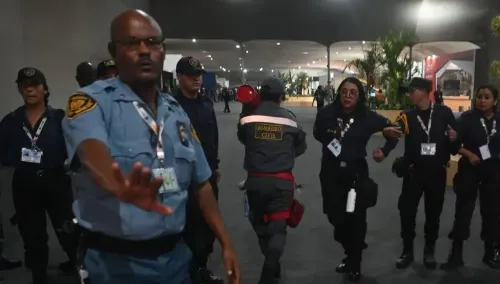Why Did South Korea Hold a Separate Memorial for Sado Mine Labor Victims Again?

Synopsis
Key Takeaways
- South Korea held a separate memorial ceremony to honor victims of forced labor at the Sado mines.
- Historical tensions between South Korea and Japan remain unresolved.
- Ambassador Lee Hyuk emphasized the importance of acknowledging past sufferings.
- The Sado mines were used to produce war supplies during World War II.
- Japan plans to continue annual memorials for the Sado mines.
Sado Island, Nov 21 (NationPress) South Korea conducted a memorial ceremony on Friday in Japan to pay tribute to Koreans who were subjected to forced labor at a gold and silver mining complex during World War II. This marks the second consecutive year that South Korea has organized its own event separate from Japan's formal ceremony.
Seoul opted not to participate in this year’s memorial organized by Japan due to unresolved differences regarding the acknowledgment of the hardships faced by Korean workers and the coercive nature of their labor.
The South Korean Embassy in Tokyo spearheaded Friday’s memorial, which was held at a hotel on Sado Island in the Niigata Prefecture, with the attendance of 11 family members of the victims.
South Korean Ambassador to Japan, Lee Hyuk, delivered a heartfelt tribute acknowledging the anguish and suffering experienced by the workers and extended his condolences to their families.
“Over 80 years ago, numerous Korean workers were brought to Sado Island against their will, either through coercive recruitment or conscription, facilitated by the Japanese governor-general of Korea, and were made to work under extremely harsh conditions,” Lee stated.
“Reflecting on the pain of the past and engaging in this remembrance will enhance our collective empathy and foster healing,” he emphasized.
Japan has committed to hosting an annual memorial event following the inscription of the Sado mines as a UNESCO World Heritage site in July 2024.
South Korea boycotted Japan's event last year, citing Japan's insincerity in honoring the victims, particularly its failure to adequately reflect their suffering and the coercive nature of forced labor during the memorial address, as reported by Yonhap news agency.
The Sado mines, renowned as a gold mine from the 17th to 19th centuries, were primarily utilized to produce war materials for the Japanese imperial military during World War II. Historical records indicate that over 1,500 Koreans were forced into labor at these mines from 1940 to 1945, during Japan's colonial rule over Korea.
Japan also hosted its own memorial ceremony for Sado in September.









